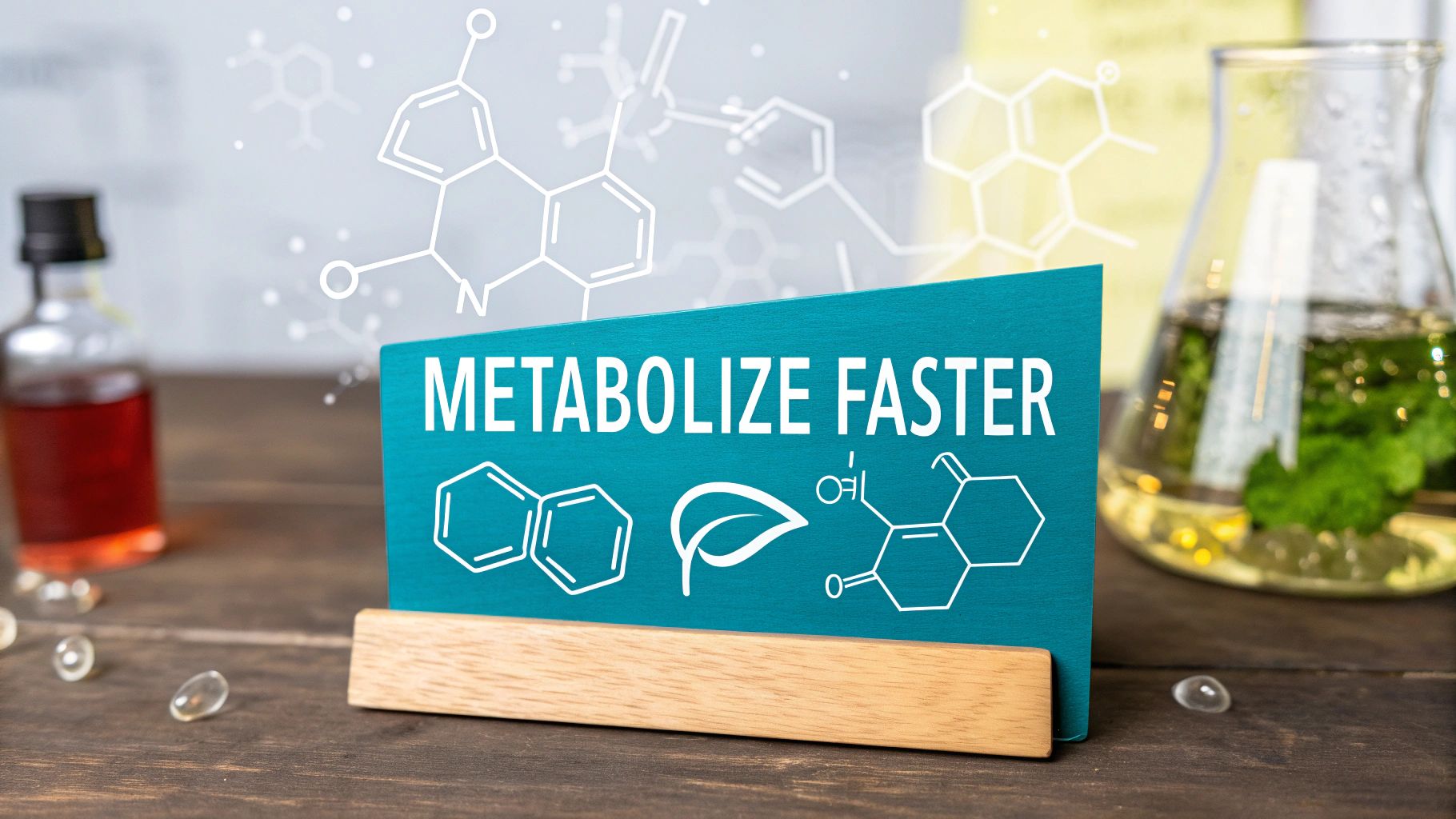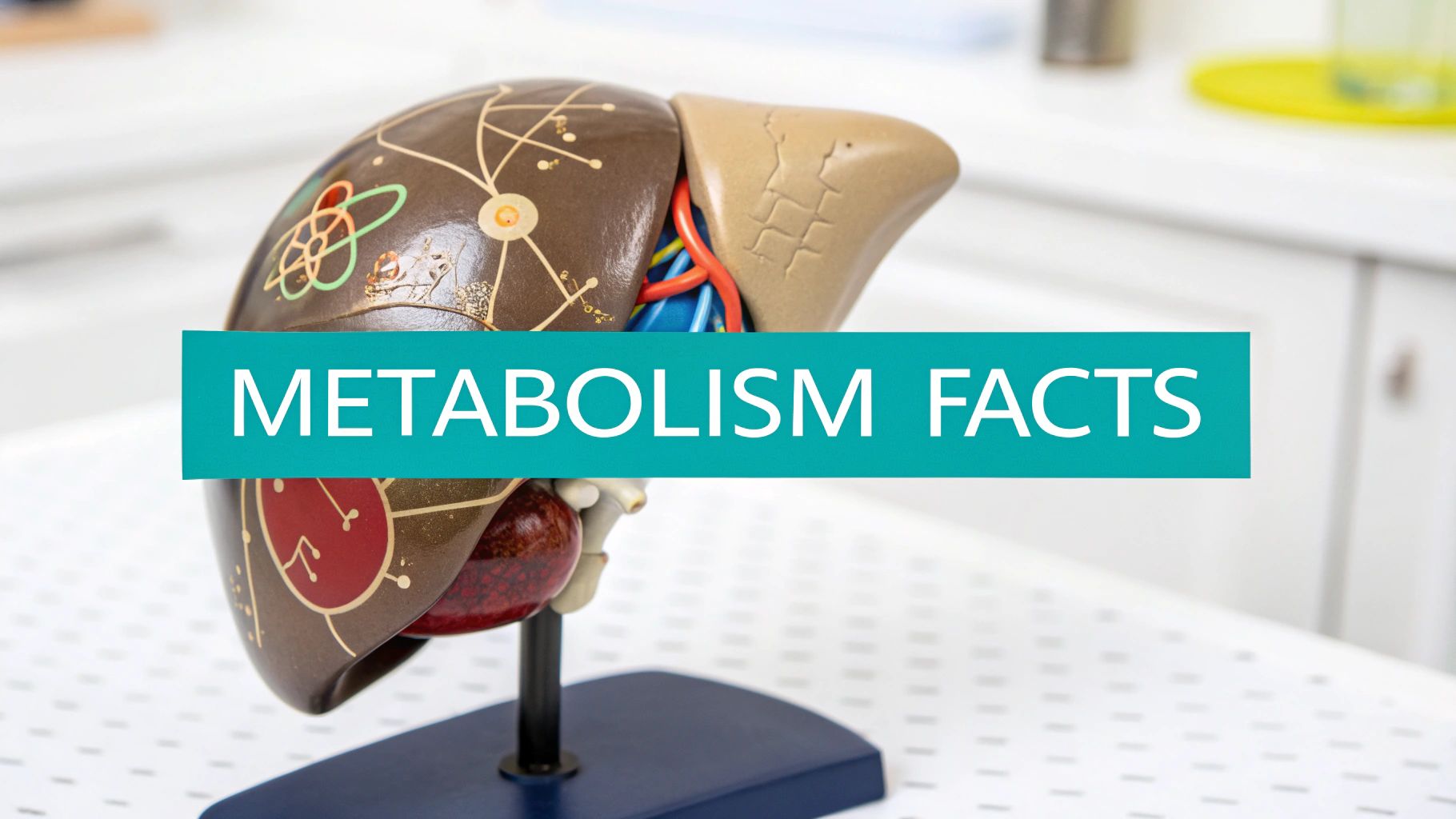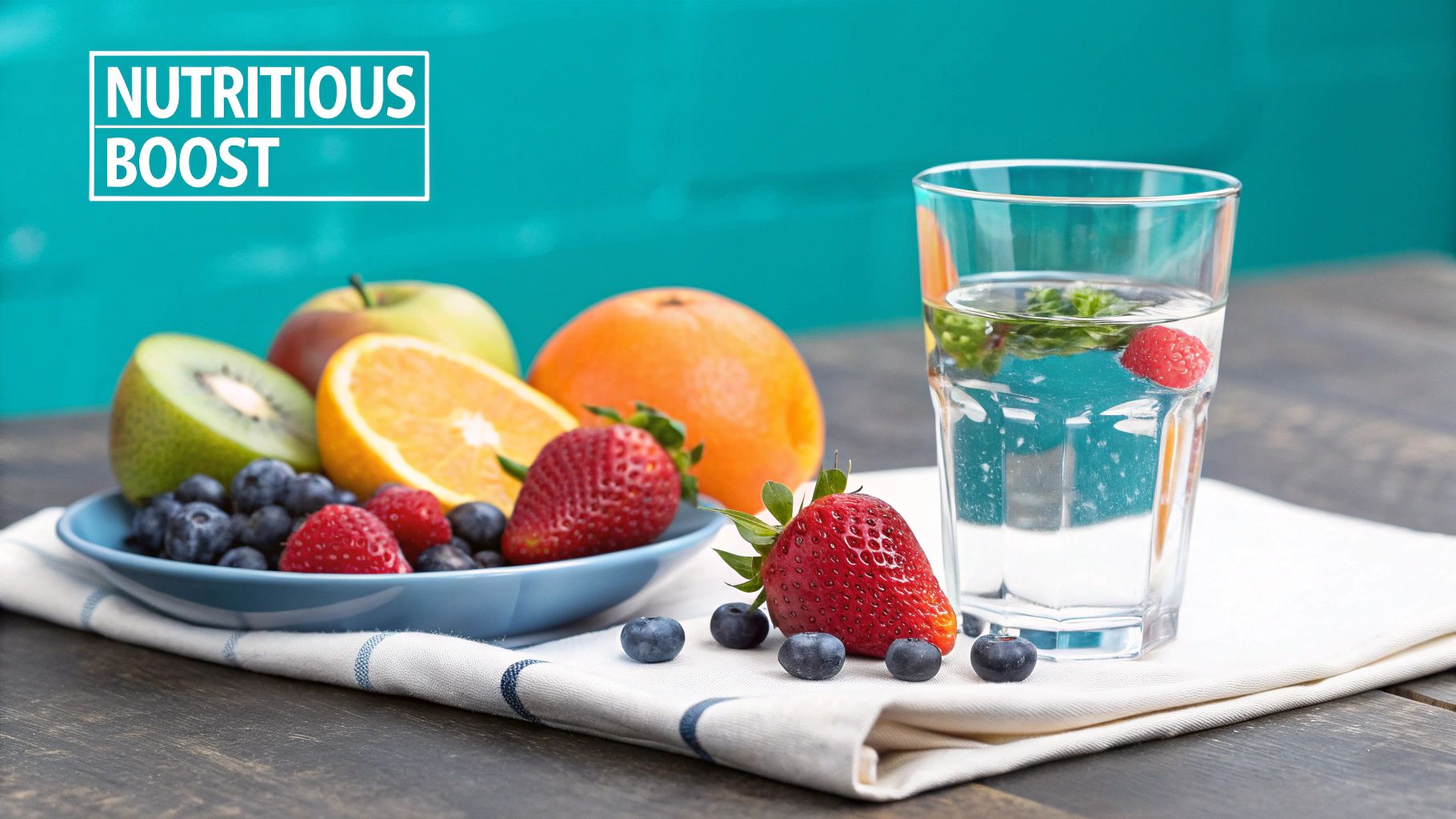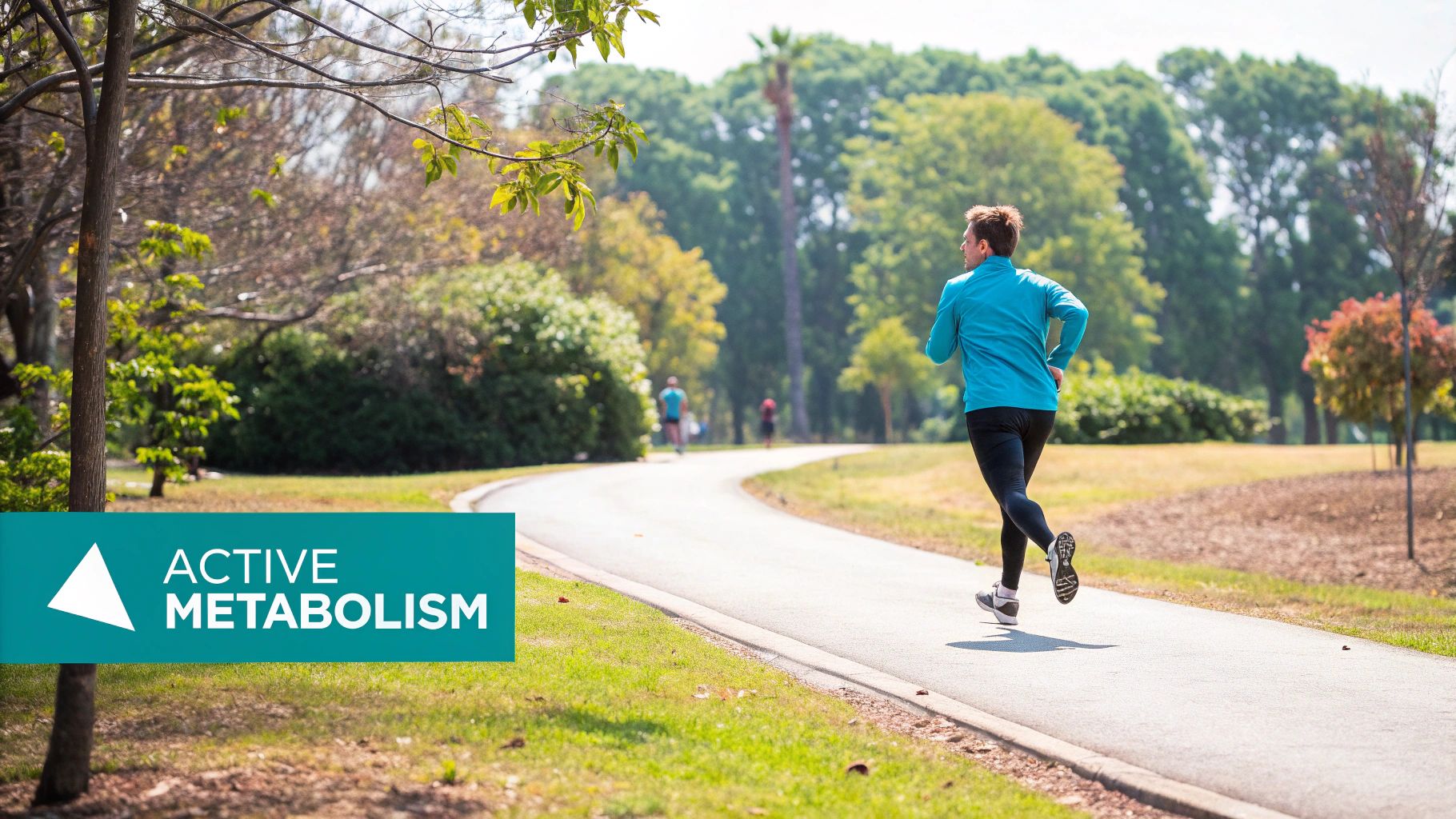

· By Annemarie
Ultimate Guide: How to Metabolize Alcohol Faster
The Science of Alcohol Metabolism: What's Actually Happening

Your body processes alcohol in a fascinating, predictable manner. Understanding this process is key to managing alcohol's effects effectively. Let's delve into the specifics of how your body breaks down alcohol.
The Role of Enzymes
The liver is the primary organ responsible for alcohol metabolism. Two key enzymes within the liver, alcohol dehydrogenase (ADH) and aldehyde dehydrogenase (ALDH), play crucial roles. ADH converts alcohol (ethanol) into acetaldehyde, a toxic compound. Learn more about alcohol metabolism.
ALDH then converts acetaldehyde into acetate, a less harmful substance. Your body can then process acetate further. This two-step process is why understanding alcohol's metabolic rate is important.
Alcohol is typically metabolized at a fairly constant rate of about 0.016% per hour. This rate remains relatively consistent regardless of your height or the type of alcohol you consume. For example, a Blood Alcohol Content (BAC) of 0.08% would require roughly five hours to reach zero.
Factors like body weight and hydration can influence this process. While drinking water can help distribute alcohol throughout your body, it doesn't speed up your metabolic rate.
The Metabolic Pathway
This two-step enzymatic process forms the foundation of alcohol metabolism. It functions much like an assembly line: alcohol enters, ADH converts it to acetaldehyde, and then ALDH converts it to acetate. Because this process occurs at a relatively constant rate, quick fixes for sobering up don’t actually work.
Factors Affecting Metabolism
Several factors can impact how efficiently your body metabolizes alcohol. Individual genetic differences influence enzyme levels, playing a significant role in the process.
Your liver's overall health and function are also crucial. Proper nutrition and hydration are essential for supporting your liver's ability to process alcohol. Finally, pre-existing medical conditions or certain medications can also influence your body's response to alcohol.
Understanding these factors allows you to make informed choices about alcohol consumption. By working with your body's natural processes, you can develop strategies for mindful and strategic drinking. We'll explore the impact of genetics, hydration, nutrition, exercise, and even supplements on alcohol metabolism in the following sections.
Your Genetic Blueprint: How DNA Influences Alcohol Processing

Your genes play a significant role in how your body processes alcohol. This means your individual response to that evening cocktail is partially predetermined by your DNA. This section delves into the genetic variations that contribute to these differences in alcohol metabolism. You might be interested in: How to master...
The Role of ADH and ALDH
Two key enzymes are responsible for the bulk of alcohol metabolism: alcohol dehydrogenase (ADH) and aldehyde dehydrogenase (ALDH). ADH converts alcohol into acetaldehyde, a toxic byproduct. ALDH then steps in to convert acetaldehyde into acetate, a less harmful substance that the body can process further.
Variations in the genes that code for these enzymes result in different versions, each with varying efficiency. Some variations process alcohol rapidly, while others work much slower. This difference in efficiency explains why some people feel the effects of alcohol quickly, while others take longer.
Genetic Variations and Their Impact
The efficiency of alcohol metabolism differs across populations. Genetic factors related to ADH and ALDH play a significant role in these differences. In some East Asian populations, for instance, certain variants of the ALDH2 gene are quite common. These variants are associated with lower enzyme activity.
This lower activity leads to increased alcohol sensitivity due to reduced first-pass metabolism (FPM), which is the initial processing of alcohol in the stomach. Explore this topic further. Historically, research has focused on the stomach's role in FPM, especially concerning enzymes like σ ADH, which metabolize alcohol at high concentrations.
This genetic predisposition can lead to noticeable symptoms like facial flushing, nausea, and a rapid heart rate, even after consuming small amounts of alcohol. It clearly demonstrates how genes directly impact alcohol processing. While FPM varies, the core metabolic pathways remain consistent. Efforts to influence metabolism often involve supporting, not bypassing, these essential enzymatic processes.
The following table provides a detailed overview of how different genetic variations impact alcohol metabolism:
Genetic Variations in Alcohol Metabolism
This table compares how different genetic variations affect alcohol processing speed and symptoms.
| Genetic Variation | Prevalence in Population | Effect on Metabolism Speed | Common Symptoms |
|---|---|---|---|
| ALDH2*2 | Common in East Asian populations | Significantly slower | Facial flushing, nausea, rapid heart rate |
| ADH1B*2 | Varies across populations | Faster than some variants | Generally fewer immediate symptoms |
| ADH1C*1 | Varies across populations | Considered a "normal" variant | Typical alcohol response |
As this table illustrates, the ALDH22 variant significantly slows alcohol metabolism, leading to pronounced symptoms. Conversely, other variations like ADH1B2 may process alcohol faster, leading to fewer immediate effects. Understanding these differences is crucial for personalized alcohol management.
Working With Your Genetic Reality
Understanding your potential genetic predispositions can empower you to make informed choices about alcohol consumption. If you suspect you have a slower-acting ALDH variant, you may choose to drink less, pace yourself more effectively, or opt for lower-alcohol beverages.
Additionally, supporting liver health through proper hydration and nutrition becomes even more crucial for individuals with these variations. Ultimately, understanding your body's unique response to alcohol is essential for responsible and informed drinking.
Strategic Hydration: Beyond Just Drinking Water

While "drink plenty of water" is common advice when consuming alcohol, the reasons why are often misunderstood. This section clarifies the link between hydration and alcohol metabolism, offering practical strategies beyond the basics.
The Science of Hydration and Alcohol Processing
Alcohol is a diuretic, increasing urine production. This can lead to dehydration, worsening hangover symptoms like headache and fatigue. Dehydration, however, doesn't directly slow alcohol metabolism. Instead, proper hydration supports liver function and helps lessen some negative effects of alcohol.
Dehydration can impair the liver’s many functions, including filtering toxins and metabolizing alcohol. While water doesn't speed up alcohol breakdown, staying hydrated helps your liver function optimally.
Electrolytes: The Unsung Heroes
Electrolytes are crucial for hydration. Alcohol can deplete essential electrolytes like sodium, potassium, and magnesium, which are vital for fluid balance, nerve and muscle function, and other bodily processes.
Replenishing electrolytes can significantly improve how you feel while drinking and afterward. This can involve electrolyte-rich drinks or foods high in these minerals. Coconut water, for example, is a natural source of electrolytes.
Practical Hydration Protocols
A strategic hydration plan can make a big difference. This involves hydrating before, during, and after consuming alcohol.
-
Before: Drinking water beforehand creates a good hydration baseline. Try one or two glasses of water before your first alcoholic drink.
-
During: Alternate alcoholic beverages with water. This maintains hydration and paces your alcohol intake. A good rule is one glass of water per alcoholic beverage.
-
After: Continue hydrating after drinking. One or two glasses of water before bed can lessen dehydration overnight. Consider an electrolyte drink in the morning to replace lost minerals.
Recognizing Dehydration
Knowing the signs of dehydration is important. These include thirst, dry mouth, headache, dizziness, and fatigue. Increase your water intake and consider an electrolyte supplement if you experience these. Staying hydrated isn't a quick fix, but it's crucial for responsible alcohol consumption and overall well-being. By understanding hydration science and using practical strategies, you can support your body and minimize alcohol's negative effects.
Nutrition Strategies That Support Alcohol Metabolism

Your food choices play a significant role in how your body processes alcohol. This section explores the important connection between nutrients and efficient alcohol metabolism. We'll delve into which foods can support your liver's detoxification processes and which nutrients can become depleted when you drink alcohol. Read also: How to master...
The Liver's Nutritional Needs
The liver is your body's main alcohol processing center. It requires specific nutrients to function optimally. B vitamins, especially B1 (thiamine), B3 (niacin), and B6 (pyridoxine), are vital for many metabolic reactions, including the breakdown of alcohol. Because alcohol can deplete these essential vitamins, ensuring an adequate intake is crucial.
The liver also relies on antioxidants to combat oxidative stress, a byproduct of alcohol metabolism. Foods rich in antioxidants like vitamin C and vitamin E can help protect the liver from damage. It's important to note that this doesn't speed up the actual breakdown of alcohol, but rather supports overall liver health.
Protein Power
Protein is essential for maintaining and repairing liver cells. Consuming protein before or during alcohol consumption can supply the building blocks your liver needs to work efficiently. This makes incorporating protein into your meals and snacks around the time you drink a smart strategy.
While protein helps support liver health, it doesn't directly speed up the breakdown of alcohol. The liver processes alcohol at a consistent rate, regardless of how much protein you consume.
Meal Timing and Composition
Eating before drinking is generally a good idea, but what you eat and when matters. Choose complex carbohydrates, lean proteins, and healthy fats. This combination can help slow alcohol absorption and provide sustained energy.
A meal with grilled chicken, brown rice, and steamed vegetables offers an excellent balance of these nutrients.
Alcohol, Metabolism, and Weight
It's also important to consider alcohol’s impact on metabolism and weight. Alcohol contains approximately 7 calories per gram, which can contribute to weight gain. Studies have shown varied correlations between alcohol intake and Body Mass Index (BMI).
Some research suggests alcohol might not significantly affect BMI in men and could even be negatively correlated in women. However, other studies link increased intake, especially of beer, to a higher BMI over time, with each additional drink per day potentially leading to an increase of around 0.19 kg over four years. Find more detailed statistics here.
Foods That Support Alcohol Metabolism
The following table provides information on foods that can support liver function and alcohol processing, along with their key nutrients and suggested timing for consumption.
| Food | Key Nutrients | Benefit for Alcohol Metabolism | Best Timing |
|---|---|---|---|
| Bananas | Potassium | Helps replenish electrolytes lost due to alcohol's diuretic effect | Before, during, or after drinking |
| Eggs | Cysteine | Aids in glutathione production, an important antioxidant for liver detoxification | Before or during drinking |
| Oats | B Vitamins | Support liver function and aid in alcohol metabolism | Before drinking |
| Berries | Antioxidants | Protect liver cells from oxidative stress | Before, during, or after drinking |
| Avocado | Healthy Fats | Can slow alcohol absorption | Before drinking |
This table highlights some key foods that can contribute to a healthy liver. Incorporating these foods into your diet can provide your body with the necessary tools to process alcohol more effectively.
By focusing on these nutritional strategies, you’re giving your body the support it needs to manage alcohol efficiently.
Movement Matters: The Exercise-Alcohol Relationship
Many people wonder if exercise can help them process alcohol more quickly. The truth is, the connection between physical activity and alcohol metabolism is a bit complicated. Let's take a closer look at how movement influences your body's handling of alcohol.
How Exercise Affects Alcohol Distribution and Metabolism
Exercise increases both blood flow and your metabolic rate. This can influence how alcohol is spread throughout your body. It's important to remember, though, that exercise doesn't directly speed up the rate at which your liver processes alcohol. Your liver metabolizes alcohol at a steady pace, regardless of your physical activity level.
Think of your bloodstream as a highway system. Exercise is like adding more lanes, allowing for quicker transport of alcohol. However, the "processing plant" (your liver) still works at its usual speed. This enhanced circulation might make you feel the effects of alcohol less intensely initially, but it doesn't remove the alcohol from your body any faster.
Timing Is Key: When to Exercise and When to Rest
Choosing when to work out around alcohol consumption is important. Exercising while intoxicated can be dangerous due to compromised coordination and decision-making. It's best to avoid strenuous activity while under the influence of alcohol. Dehydration from exercise can worsen the dehydrating effects of alcohol, making proper hydration crucial.
Exercising after drinking, once the alcohol has completely cleared your system, can support your overall health. It can help your body recover by increasing circulation and facilitating the removal of toxins through sweat.
Types of Movement and Their Impact
Different types of exercise affect your body in different ways. Low-intensity activities such as walking or yoga after drinking (once sober) can improve circulation and help you feel better. High-intensity exercise while intoxicated is strongly discouraged due to potential risks.
It's crucial to remember that no form of exercise magically accelerates your liver's alcohol processing. Prioritize movement that contributes to overall wellness, rather than seeing exercise as a quick solution for alcohol metabolism.
Practical Movement Strategies for Different Scenarios
If you plan on drinking, consider a light workout before you consume alcohol, ensuring you stay well-hydrated. Avoid exercising while intoxicated. The next day, once you're completely sober, moderate exercise can be a helpful part of your recovery routine.
This strategy promotes responsible exercise habits alongside sensible alcohol consumption. It puts your safety and well-being first. Using Upside Hangover Sticks can further assist your recovery process, enabling you to feel your best after a night out. They provide a convenient and efficient way to support your body's natural recovery. Unlike trying to force your body to process alcohol more quickly, Upside works by lessening the after-effects so you can enjoy life to the fullest.
Supplement Truth: What Actually Works For Faster Alcohol Processing
The supplement market is overflowing with products promising a quicker exit for alcohol from your system. But do these claims hold water? This section offers a clear-eyed look at popular supplements marketed for faster alcohol processing, separating genuine benefits from marketing hype.
Milk Thistle: Liver Support, Not a Metabolism Booster
Milk thistle is frequently praised for its liver-supporting qualities. Its active ingredient, silymarin, is thought to possess antioxidant and anti-inflammatory effects. While milk thistle may contribute to long-term liver health, there's no solid scientific evidence to suggest it speeds up alcohol metabolism. Think of it as a long-term investment in liver wellness rather than a quick detox solution.
NAC: A Potential Ally
N-acetyl cysteine (NAC) is a precursor to glutathione, a potent antioxidant vital for liver detoxification. Preliminary research indicates NAC might help restore glutathione levels diminished by alcohol, potentially mitigating some negative effects. However, further studies are necessary to confirm its efficacy in directly accelerating alcohol metabolism.
B Vitamins: Essential, But Not a Quick Fix
B vitamins are essential for numerous metabolic functions, including the breakdown of alcohol. Alcohol consumption can deplete these crucial vitamins, so replenishing them is important. While a B-vitamin complex can contribute to overall health and perhaps alleviate some hangover symptoms, it won't accelerate the rate at which your body processes alcohol.
Proprietary Hangover Formulas: Proceed With Caution
Many "hangover pills" or "miracle cures" contain a blend of ingredients, often including vitamins, herbs, and electrolytes. Some components might offer minor benefits like hydration or restoring depleted nutrients. However, the overall effectiveness of these products is often debatable. Combining exercise with alcohol consumption requires further consideration. Learn more about how sports recovery can be affected. You might also find valuable information in our blog resources on health and wellness.
The Bottom Line on Supplements
While certain supplements may offer liver support and reduce some adverse effects of alcohol, there's no magic solution to significantly speed up alcohol metabolism. Your liver processes alcohol at a relatively fixed pace. Prioritize supporting your body's natural processes through adequate hydration, proper nutrition, and responsible drinking habits. Instead of looking for a quick fix, consider Upside Hangover Sticks. These sticks don't accelerate metabolism, but they target the after-effects of alcohol, helping you feel better faster. They provide a practical and convenient approach for managing the morning after.
Real-World Strategies: How to Metabolize Alcohol Faster Safely
This section offers practical advice to help your body process alcohol naturally. We'll explore helpful strategies for before, during, and after drinking.
Pacing and Hydration: Your Best Allies
You can't actually speed up your liver's fixed alcohol metabolism rate. However, smart strategies can help you manage alcohol's effects. Pacing yourself is key. Alternating alcoholic drinks with water keeps you hydrated and slows your overall alcohol consumption. Hydration itself is crucial. Alcohol is a diuretic, so replenishing fluids is vital.
Pre-Drinking Preparation: Setting the Stage for Success
Preparing your body before you drink can make a difference. Eating a balanced meal with protein, complex carbs, and healthy fats helps slow alcohol absorption. Hydrating beforehand establishes a healthy fluid baseline.
During Drinking: Smart Strategies for Social Settings
When you're out with friends, stick to your pacing strategy. Alternate alcoholic beverages with water. Choose lower-alcohol options when you can. Be mindful of your limits.
Post-Drinking Recovery: Minimizing the After-Effects
After drinking, continue hydrating with water. Consider an electrolyte drink to replenish lost minerals. A balanced meal can help stabilize your blood sugar and restore essential nutrients. Rest is also crucial; your body needs time to recover.
Recognizing Your Limits and Seeking Support
Understanding your body's signals is important. If you experience signs of alcohol poisoning, like confusion, vomiting, seizures, or difficulty breathing, seek immediate medical attention. For those struggling with alcohol dependence, professional help is available. Resources like the Substance Abuse and Mental Health Services Administration (SAMHSA) National Helpline can offer guidance and support.
Managing alcohol consumption means respecting your body’s natural processes. While you can’t accelerate your metabolism, you can support your body’s natural mechanisms with simple strategies before, during, and after drinking. For managing the after-effects of alcohol, you could try Upside Hangover Sticks. These don't increase alcohol metabolism speed, but they can decrease hangover symptoms, helping you get back to feeling your best. Check out Upside Hangover Sticks here.
